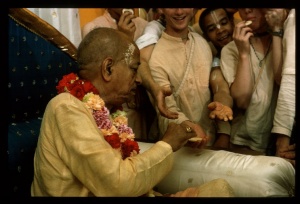SB 8.14.8: Difference between revisions
No edit summary |
(Vanibot #0054 edit - transform synonyms into clickable links, which search similar occurrences) |
||
| Line 23: | Line 23: | ||
<div class="synonyms"> | <div class="synonyms"> | ||
''jñānam'' | ''[//vanipedia.org/wiki/Special:VaniSearch?s=jñānam&tab=syno_o&ds=1 jñānam]'' — transcendental knowledge; ''[//vanipedia.org/wiki/Special:VaniSearch?s=ca&tab=syno_o&ds=1 ca]'' — and; ''[//vanipedia.org/wiki/Special:VaniSearch?s=anuyugam&tab=syno_o&ds=1 anuyugam]'' — according to the age; ''[//vanipedia.org/wiki/Special:VaniSearch?s=brūte&tab=syno_o&ds=1 brūte]'' — explains; ''[//vanipedia.org/wiki/Special:VaniSearch?s=hariḥ&tab=syno_o&ds=1 hariḥ]'' — the Supreme Personality of Godhead; ''[//vanipedia.org/wiki/Special:VaniSearch?s=siddha&tab=syno_o&ds=1 siddha]-[//vanipedia.org/wiki/Special:VaniSearch?s=svarūpa&tab=syno_o&ds=1 svarūpa]-[//vanipedia.org/wiki/Special:VaniSearch?s=dhṛk&tab=syno_o&ds=1 dhṛk]'' — assuming the form of liberated persons like Sanaka and Sanātana; ''[//vanipedia.org/wiki/Special:VaniSearch?s=ṛṣi&tab=syno_o&ds=1 ṛṣi]-[//vanipedia.org/wiki/Special:VaniSearch?s=rūpa&tab=syno_o&ds=1 rūpa]-[//vanipedia.org/wiki/Special:VaniSearch?s=dharaḥ&tab=syno_o&ds=1 dharaḥ]'' — assuming the form of great saintly persons like Yājñavalkya; ''[//vanipedia.org/wiki/Special:VaniSearch?s=karma&tab=syno_o&ds=1 karma]'' — karma; ''[//vanipedia.org/wiki/Special:VaniSearch?s=yogam&tab=syno_o&ds=1 yogam]'' — the mystic yoga system; ''[//vanipedia.org/wiki/Special:VaniSearch?s=yoga&tab=syno_o&ds=1 yoga]-[//vanipedia.org/wiki/Special:VaniSearch?s=īśa&tab=syno_o&ds=1 īśa]-[//vanipedia.org/wiki/Special:VaniSearch?s=rūpa&tab=syno_o&ds=1 rūpa]-[//vanipedia.org/wiki/Special:VaniSearch?s=dhṛk&tab=syno_o&ds=1 dhṛk]'' — by assuming the form of a great yogī like Dattātreya. | ||
</div> | </div> | ||
Latest revision as of 23:17, 18 February 2024

A.C. Bhaktivedanta Swami Prabhupada
TEXT 8
- jñānaṁ cānuyugaṁ brūte
- hariḥ siddha-svarūpa-dhṛk
- ṛṣi-rūpa-dharaḥ karma
- yogaṁ yogeśa-rūpa-dhṛk
SYNONYMS
jñānam — transcendental knowledge; ca — and; anuyugam — according to the age; brūte — explains; hariḥ — the Supreme Personality of Godhead; siddha-svarūpa-dhṛk — assuming the form of liberated persons like Sanaka and Sanātana; ṛṣi-rūpa-dharaḥ — assuming the form of great saintly persons like Yājñavalkya; karma — karma; yogam — the mystic yoga system; yoga-īśa-rūpa-dhṛk — by assuming the form of a great yogī like Dattātreya.
TRANSLATION
In every yuga, the Supreme Personality of Godhead, Hari, assumes the form of Siddhas such as Sanaka to preach transcendental knowledge, He assumes the form of great saintly persons such as Yājñavalkya to teach the way of karma, and He assumes the form of great yogīs such as Dattātreya to teach the system of mystic yoga.
PURPORT
For the benefit of all human society, not only does the Lord assume the form of Manu as an incarnation to rule the universe properly, but He also assumes the forms of a teacher, yogī, jñānī and so on, for the benefit of human society. The duty of human society, therefore, is to accept the path of action enunciated by the Supreme Lord. In the present age, the sum and substance of all Vedic knowledge is to be found in Bhagavad-gītā, which is personally taught by the Supreme Personality of Godhead, and the same Supreme Godhead, assuming the form of Śrī Caitanya Mahāprabhu, expands the teachings of Bhagavad-gītā all over the world. In other words, the Supreme Personality of Godhead, Hari, is so kind and merciful to human society that He is always anxious to take the fallen souls back home, back to Godhead.